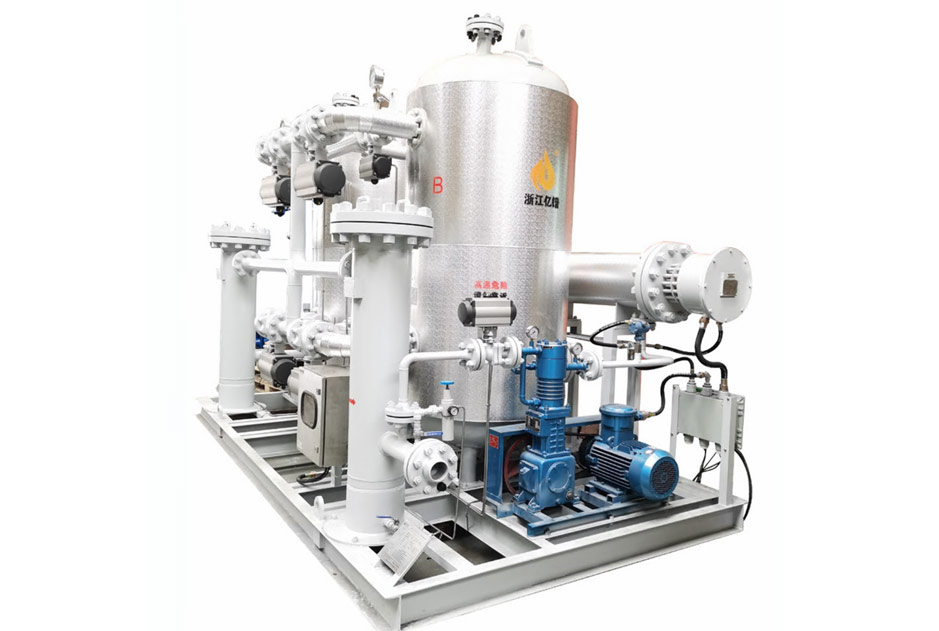Compressed Air Drying Solutions for the Manufacturing Industry
Industry Pain Points
Moisture Corroding Key Equipment: Moisture in compressed air causes rusting of pneumatic components, shortening the average service life of solenoid valves from 5 years to 1.5 years and increasing annual maintenance costs by 35%.
Oil-Water Mixture Contaminating Products: In the food/pharmaceutical industries, compressed air containing oil and water (0.5-5ppm) leads to packaging contamination, with losses from a single quality accident reaching up to 2 million yuan.
High Energy Consumption Costs: The regeneration energy consumption of traditional adsorption dryers ranges from 0.15-0.3kWh/Nm³, accounting for 25-40% of the total power consumption of the air compression system.
Low Intelligence Level: 85% of drying equipment lacks remote monitoring and cannot predict faults. Sudden shutdowns cause production line losses of 50,000-100,000 yuan per hour.
System Overview
Through the “high-efficiency condensation – deep adsorption – heat recovery” technology chain, Yipu Manufacturing Industry Drying System achieves:
- Equipment Protection: Extends the service life of key pneumatic components to over 5 years.
- Quality Assurance: Completely eliminates secondary pollution caused by compressed air.
- Intelligent Management: Real-time monitoring of over 50 parameters (including energy consumption and dew point) via a mobile APP.
Solution Approach
Yipu Manufacturing Industry Compressed Air Drying Solution
| Module | Technical Highlights | Performance Indicators |
|---|---|---|
| Variable-Frequency Refrigerated Dryer | Permanent magnet synchronous motor, IP65 protection | Dew point +3℃@40℃, energy consumption ≤0.08kWh/Nm³ |
| Two-Stage Adsorption Tower | Quick-opening structure, molecular sieve replacement completed in 5 minutes | Outlet dew point -40℃, oil resistance service life of 5 years |
| Heat Recovery Device | Plate heat exchanger recovers waste heat from air compressors | Regeneration energy consumption ≤0.03kWh/Nm³ |
| Intelligent Electric Cabinet | Supports MODBUS TCP/OPC UA protocols | Fault early warning accuracy ≥95% |
| Clean Type | 316L stainless steel pipelines, inner wall polishing with Ra ≤0.8μm | Complies with ISO 8573-1 Class 0 |
Applicable Scenarios:
- Spraying/welding in automobile manufacturing
- Inflation for food and beverage packaging
- Aseptic production environments in the pharmaceutical industry
Technical Principles
Yipu Three-Stage Intelligent Drying Process:
- High-Efficiency Condensation (Stage 1):Variable-frequency screw refrigeration technology cools 40℃ saturated air to 3℃, removing 85% of moisture (dew point +3℃) with a COP value of up to 4.0.
- Deep Adsorption (Stage 2):Composite adsorption bed:
- Upper activated alumina intercepts oil mist (residual oil ≤0.001ppm)
- Lower 3A-MFG molecular sieves achieve a dew point of -40℃
- Waste Heat Regeneration (Stage 3):Recovers 80℃ waste heat from air compressors to regenerate molecular sieves, saving 80% more energy than electric heating.
- Intelligent Control:IoT sensors real-time monitor dew point and pressure drop, while AI algorithms dynamically adjust refrigeration/regeneration cycles.
Core Advantage
| Advantage | Details |
|---|---|
| Customized on Demand | Meets special working conditions; provides professional non-standard customization |
| Low Cost | Adopts cyclic regeneration process; significantly reduces operating costs |
| High Stability | Dual-tower structure with small pressure fluctuation; low noise and continuous air supply |
| Fully Automatic Operation | Easy to operate, reducing labor input; improves efficiency |
| High Safety | Presets multi-level safety protection measures; supports automatic alarm |
| Low Failure Rate | Maintains low failure rate after 10,000 hours; high durability with almost no maintenance required |
Technical Strength
Leading Adsorption Dehydration Technology
Uses high-performance molecular sieve adsorbents with high water absorption capacity and resistance to corrosion by acidic gases (H₂S/CO₂), ensuring deep dehydration with a dew point ≤-70℃.
The original hot nitrogen regeneration process reduces energy consumption by 30% compared with traditional electric heating regeneration, and integrates a waste heat recovery system to significantly improve energy efficiency.
Modular and Customized Design Capability
Core equipment adopts modular prefabrication, supporting rapid deployment (installation cycle shortened by 50%) and adapting to diverse scenarios such as offshore platforms, onshore gas fields, and LNG pretreatment.
Can customize single-tower, dual-tower, or multi-tower parallel systems according to customer needs, with a treatment capacity ranging from 10,000 to 1,000,000 Nm³/d, flexibly matching gas fields of different scales.
Intelligent Control and Remote Operation & Maintenance
Equipped with a PLC+IoT intelligent control system, it real-time monitors key parameters such as pressure, temperature, and dew point, supporting fault early warning and automatic adjustment.
Through cloud-based big data analysis, it optimizes the adsorption-regeneration cycle, extends the service life of molecular sieves, and reduces operation and maintenance (O&M) costs by 10%-15%.
Energy-Saving and Environmental Protection Technology
Features zero-emission design for regeneration exhaust gas, complying with international environmental standards such as EU CE and US EPA.
Energy consumption is 25%-40% lower than that of traditional triethylene glycol (TEG) dehydration systems, helping customers achieve carbon emission reduction goals.
Long-Cycle Operation Reliability
Molecular sieves adopt anti-pulverization coating technology, with a service life of over 5 years, reducing replacement frequency.
Key components (e.g., valves, instruments) are selected from international first-tier brands (e.g., Siemens, Emerson), with a Mean Time Between Failures (MTBF) of over 100,000 hours.
Strong R&D and Engineering Experience
Possesses more than 19 patents and software copyrights in dehydration technology; the R&D team is led by doctors and has in-depth cooperation with universities and colleges.
Has over 1,000 successful cases worldwide, covering extreme working conditions such as high-sulfur gas fields in the Middle East and low-temperature environments in the Arctic.
Product Advantage Comparison
| Indicator | Yipu System | Traditional Refrigeration Type | Competitor Adsorption Type | Combined Drying Type |
|---|---|---|---|---|
| Dew Point | -40℃ (scalable to -70℃) | +3℃ | -40℃ (high energy consumption) | -20℃ |
| Residual Oil Content | ≤0.001ppm | ≤1ppm | ≤0.01ppm | ≤0.005ppm |
| Energy Consumption | 0.11kWh/Nm³ (comprehensive) | 0.08kWh/Nm³ | 0.25kWh/Nm³ | 0.18kWh/Nm³ |
| Intelligent Functions | AI predictive maintenance + remote monitoring | None | Basic alarm function | Partial networking |
| Payback Period | 1.2 years (calculated at gas price 0.6 yuan/Nm³) | No energy-saving benefit | 3.5 years | 2.8 years |
Typical Case
Project Name: A New Energy Vehicle Battery Factory
Operating Conditions:
- Treatment Capacity: 12,000 Nm³/h, requiring dew point -40℃ and zero oil content
- Usage: Laser welding shielding gas, coater drive gas
Effect:
- Dew point stably maintained at -42℃, oil content at 0.0008ppm
- Welding defect rate reduced from 1.2% to 0.05%
Economic Benefits:
- Annual electricity cost savings of 5.8 million yuan
- Reduced battery scrap losses by 90 million yuan per year

